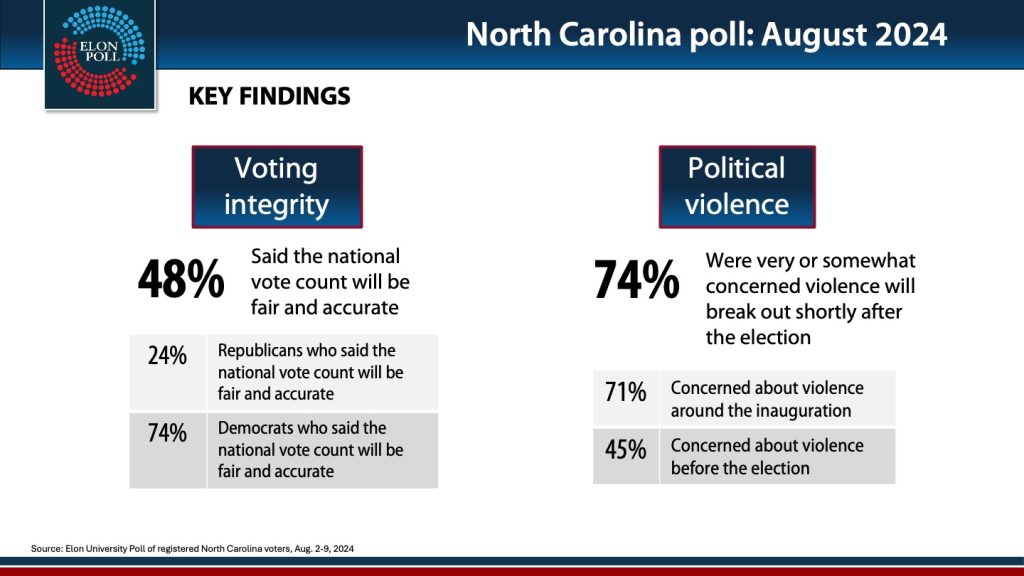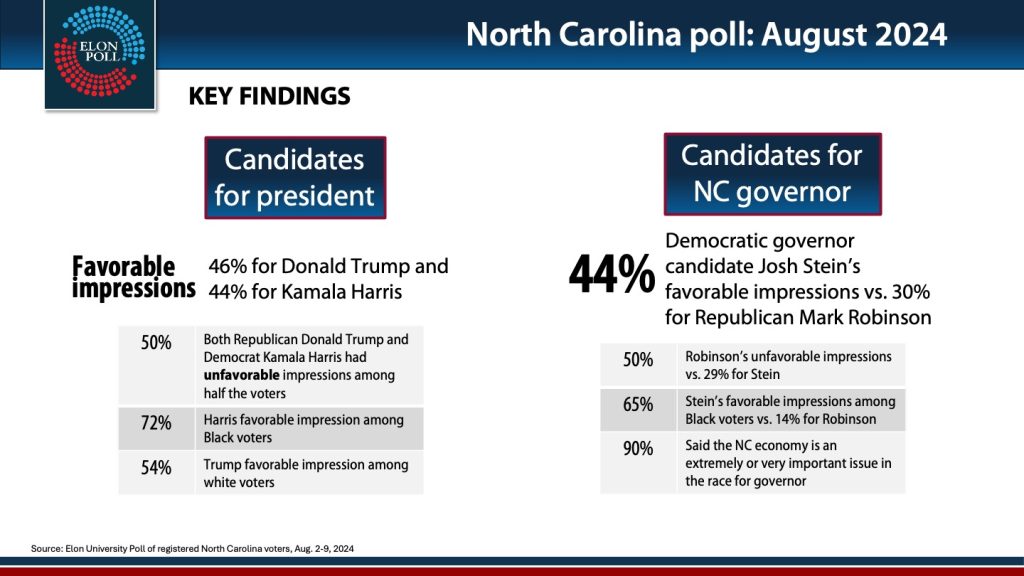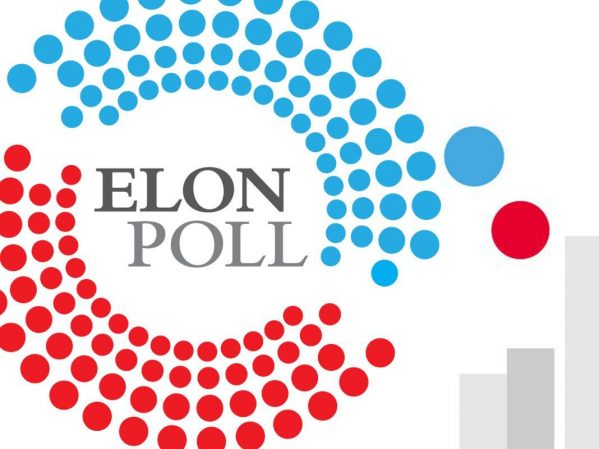The survey of N.C. voters conducted Aug. 2-9 also provided insights into what voters think about candidates for president and governor as well as their thoughts about the current state of the economy.
The first survey by the Elon University Poll for North Carolina’s fall 2024 election season found a high level of concern among state voters about the integrity of this year’s vote count and potential violence in the wake of the Nov. 5 election. The survey also provided a look at how potential voters view the candidates for president and governor and revealed deep concerns about the economy and other issues in the state.
The survey of registered North Carolina voters was conducted Aug. 2-9 and gauged opinions after Kamala Harris replaced Joe Biden on the Democratic ticket for president, but before the Democratic National Convention.
“Having been won by Republican presidential candidates for three elections in a row, North Carolina is sometimes called into question as a swing state,” said Professor Jason Husser, director of the Elon University Poll. “Our data show that North Carolina’s electoral votes remain up for grabs by either party, but winning those votes will involve navigating a divided, complex and engaged electorate.”
Review the full report and a report analysis to learn more details about the survey results.
Election integrity and the aftermath of the vote
This summer saw major disruptions in the presidential campaign, including the attempted assassination of Donald Trump and Biden’s decision to not seek re-election. Following the major political news of the summer, 51% of registered voters in the state said they were more interested in voting, a sentiment shared by both Republicans and Democrats.
While many said they are more interested in casting a ballot in November, many voters also had concerns about disruptions around the election and the integrity of the vote-counting process.
- Only 48% of the state’s voters said they have confidence the national vote count will be fair and accurate. Only about one out of four Republican voters expressed confidence in the national vote count. This is a major change from voters’ expectations prior to the 2020 presidential election, when the Elon Poll found that 69% of voters were confident that the election process would be fair and 67% expected that votes would be counted accurately.
- Nearly three-quarters of voters said they were very or somewhat concerned political violence will occur after the election and/or around the inauguration. That’s about the same level of concern that the Elon Poll found four years ago heading into Election Day.
- 39% of voters said they think that democracy will be strengthened as a result of this year’s election, while 32% said it will be harmed after the election is over.
- Only 15% of voters said that would be “very willing” to compromise getting what they want on an issue extremely important to them in exchange for American politics becoming less divisive and polarized.
“Fair elections and peaceful transfers of power are key hallmarks of democracy and major drivers behind the historical success and prosperity of democratic societies compared to other systems of government,” Husser said. “That less than half of North Carolina voters are confident in fair vote counts and almost three quarters are concerned about political violence is consistent with barely over a third thinking that democracy will be stronger after 2024. The conundrum is that, despite voters seemingly recognizing this as a problem related to polarization, very few voters report being very willing to compromise on their issues in exchange for less divisiveness.”

North Carolina as a ‘battleground state’
Again this year, North Carolina is a battleground state in the presidential race. The Elon Poll found that Republican Donald Trump and Democrat Kamala Harris enjoyed close favorable ratings in North Carolina: 46% for Trump and 44% for Harris. Both were viewed unfavorably by 50% of voters.
- Among male voters, Donald Trump had a 50% favorable impression, compared with 39% for Kamala Harris. Among female voters, Harris had a 47% positive impression vs. 43% for Trump.
- There was a wide racial divide, with Harris gaining a positive impression among 72% of Black voters, compared with 17% who had positive views of Trump. Trump had stronger favorable numbers among white voters, with a 54% voicing positive impressions vs. 35% for Harris.
In the race for governor, voter impressions of Democrat Josh Stein were more positive than for Republican Mark Robinson. Some 44% had very or somewhat favorable views of Stein, compared with 30% who had favorable views of Robinson. On the negative side, 50% of state voters had unfavorable views of Robinson, while 29% had unfavorable views of Stein.
- Among female voters, 46% had a favorable impression of Stein, compared with 23% for Robinson.
- Among Black voters, 65% had a favorable impression of Stein, compared with 14% for Robinson.
“While our favorability data shows Trump and Harris with competitive levels of support, our data also shows a clear favorability advantage for Josh Stein over Mark Robinson,” Husser said. “This is not because Stein seems exceptionally popular – his overall favorability is similar to that of Harris. Rather, Stein’s 14-point favorability advantage over Robinson comes from Robinson being far less popular than Trump among both Republicans and Independents.”

The survey showed that ticket-splitting among Republicans could be a factor in the races for governor and president. Some 16% of Republicans in the state said they will split their votes by party for governor and president, compared with just 6% of Democrats.
A significant share of registered voters said both political parties in North Carolina have become more extreme on issues since 2020. About 41% said the Republican Party in North Carolina has taken positions on issues that are more extreme, and 31% believe that about the Democratic party.
The economy and other issues
A large majority of registered voters expressed concern about the state’s economy and their own financial situation.
- 90% said the state’s economy is an extremely or very important issue when casting their vote for governor, including 94% of Republicans and 86% of Democrats.
- 80% of Republicans said their personal financial situation has gotten worse since President Biden took office, compared with only 17% of Democrats who said their personal finances had worsened. Some 40% of Democrats said things have gotten better, vs. only 3% of Republicans.
- 78% of N.C. voters said inflation has negatively affected their family over the past six months.
- 89% of the state’s voters reported local housing prices in their area are “much” or “somewhat” higher than two years ago and 71% said they could not afford to buy a house or rent a place like their current residence if they were on the market today.
- Two-thirds of N.C. voters said the Biden administration is responsible for the current state of the economy.
Abortion is another top issue voters said they will consider when voting for governor. Some 44% thought the state should decrease restrictions on abortion that were passed in 2023. That compares with 27% who said the laws should stay as they are and 16% who would prefer to increase the restrictions. Democrats were far more likely to say that abortion is an important issue and to call for reducing restrictions.
Poll methodology
This survey was constructed by the Elon University Poll in partnership with The Charlotte Observer, The News & Observer and The Durham Herald-Sun and fielded by the international marketing and polling firm YouGov as an online, web-based survey, self-administered with online panels. YouGov interviewed 1,095 respondents who were registered voters in North Carolina. These respondents were then matched down to a sample of 800 to produce the final dataset.
Throughout this report, the analysis of partisan differences compares the views of Republicans plus those who lean Republican in their voting preference with Democrats plus those who lean Democratic.
The margin of error for this poll (adjusted for weights) is +/-3.86%.



